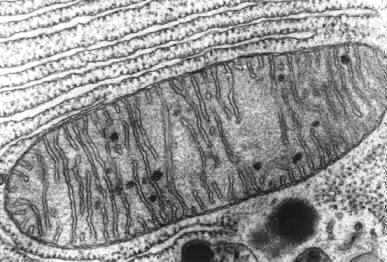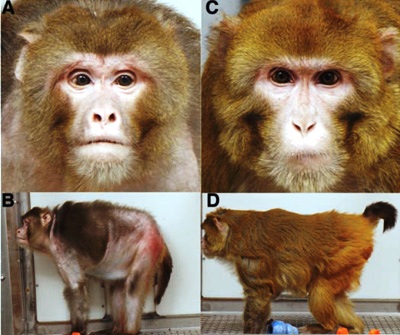In 2009 the Nobel Prize for Medicine was shared between 3 Americans (Jack Szostak of Harvard Medical School, Carol Greider of Johns Hopkins, and Elizabeth Blackburn of UCSF) for the discovery of the enzyme telomerase. Telomerase lengthens the ends of the chromosomes, known as telomeres, whose purpose is to protect the genetic information stored in the chromosomes. Without telomeres, chromosome ends could fuse together and degrade the cell's genetic blueprint. Telomerase can eliminate some of the contraction of the chromosomes so they can maintain their length.

2009 Nobel Price Winners for Telomerase Research
Every time the cell divides the telomere caps get shortened. Since the telomeres do not contain any important information, the most important parts of the DNA are protected. However, when the telomeres become too short, the cells can no longer divide and our body stops making those cells. Over time, this leads to aging and death. Cells in our body replicate 50-70 times in our life time.
It has been well known for some time, that as we age the cells cannot continue dividing due to telomere shortening. Other factors besides aging that can strongly affect the telomere shortening are stress, depression and unhealthy lifestyle (no exercise, obesity and bad diet). It has been shown that change of lifestyle can lengthen the telomeres, and therefore slow and reverse the aging process. With healthy eating, regular exercise, weight management, good supplements and positive outlook on life we can slow down the telomere shortening.
Another Reason It is Hard to Slow Aging
We know that aging depends on the cells lesser ability to replicate themselves. During the DNA replication process essential parts of the DNA can be damaged. When a cell divides it does not only accumulate the length of the previous cells but also all the genetic mistakes. Aging is therefore the buildup of genetic and cellular error, mainly in telomerase active cells. As the cells age, they become sluggish because genetic mistakes build up. The innate repair mechanisms of the cells are also becoming sluggish. A brunch of gerontology deals with how well we can accelerate the repair mechanisms of the cells.
Can Telomerase Reverse The Aging Process?
A measure of cell aging provides a measure of health, disease risk, and our ability to respond to therapeutic drugs. We have known for many years that as a cell ages, its telomeres become shorter. Shorter telomeres are associated with shorter lives, says geneticist Richard Cawthon. Other researchers have found a correlation between telomere length and susceptibility to certain aging-related diseases.  No doubt, telomere shortening is linked to the aging process. We can determine, therefore, the rate of cell division, and consequently the rate we age, by measuring the length of the telomeres.
When telomeres are too short, some cells turn into cancer. Cancerous cells have the ability to prevent their telomeres from getting shorter by activating telomerase. If telomerase makes cancer cells immortal, how would the administration of telomerase prevent normal cells from becoming cancerous? Dr. David Sinclair believes that cancerous tumors can be prevented with the activation of telomerase.
However, how can we make sure that when we hit normal cells with telomerase we do not affect in the process also the cancer cells? Or is it possible that telomerase activation could reduce the chances of cells becoming cancerous by keeping all telomeres longer in the first place? Would immune cells be kept alive longer, and fight off most cancerous cells? The scientific community is working hard to unravel the answers to the complete telomere story.
Can We Slow Aging With A Pill?

Root of the astragalus plant
T.A. Sciences is the first company manufacturing a supplement in a pill form, in hopes of reversing the aging process and slow aging. Their product, called TA 65, is a natural activator of the enzyme telomerase and has been shown to stop telomeres from shortening. It is derived from the roots of the astragalus plant requires no approval from the U.S. Food and Drug Administration because it is marketed as a supplement and not a drug.  Persons who took this expensive supplement reported more clarity, increased energy, weight loss, improved sleep, better digestion and in the long run better skin appearance. Dr. Ed Park’s patients also report serious spinal malfunctions and back pain improvement.
Telomerase activation influences only a few genes, which are all related to cell cycle repair and DNA repair. If telomerase is the same enzyme that allows cancer cells to become immortal, there is a chance that TA-65 could keep alive cancer cells that would otherwise die, notes William Andrews who has worked on telomere biology for the past 15 years.  However, the potential risks involved in taking telomerase, has not stopped Andrews from being a client of T.A. Sciences.
Per physicist Michio Kaku, however, telomerase research is a significant breakthrough but taking telomerase is not the fountain of youth. There are other factors contributing to aging. Our current knowledge on telomerase is just a piece of a tantalizing truth that may enable us to unravel the aging process in the future when combined with other therapies aiming to reverse aging.
Filed under Blog, Anti Aging Research by ![]()
Watch Dr. Aubrey De Grey: Cure Aging & Live to 1000…Possible
Do we really want to live longer? Do we have any control on how to live a longer life? How can we slow aging? How close are we to finding an elixir for youth? Should we try to reverse aging or just accept it as an inevitable part of life? Would it make a difference if we change our attitude towards growing old or is it just a matter of genes we have no control over? Scientists may disagree on the role the environment plays, but they all agree that we will eventually be able to reverse aging and slow the aging process.

Dr. Aubrey de Grey
Dr. Aubrey de Grey is a pioneering theoretical scientist in the field of human aging (biogerontology). He says that we can substantially slow aging and live to be several hundred years old.
Today we are becoming more and more capable of addressing how to slow aging. However, Dr. Aubrey de Grey says it turns out that is going to be easier to reverse the aging process than to prevent it. Â The reason is that it is easier to repair the damage than to prevent the damage from happening.
Filed under Blog, Anti Aging Research by ![]()
Interviews-With-Leading-Experts-on-Caloric-Restriction-and-its-Relationship-to-the-Aging-Process
For years there has been news in the scientific press on how to slow aging with caloric restriction. Scientific research leads us now to believe that premature problems with aging are not totally a natural step in life. Age-related diseases, resulting from the final breakdown of a system that has suffered a great deal of biochemical and cellular damage, can be pushed further away or even prevented.
Caloric restriction (CR), a nutrient dense diet that should not be confused with starvation, is one of the sure means to promote better health and potentially slow aging in humans.
Caloric Restriction has been the subject of serious scientific studies and has been known to alter fundamental biological processes that regulate aging and increase lifespan while decreasing mortality and morbidity in short-lived animal experiments. Even mice, which were not on caloric restriction until their middle age, showed a significant increase of life span. Scientists, therefore, tend to believe that caloric restriction shows benefits even when started late in life.
In rodents, CR was reported to delay the aging of the immune system, which is believed to be largely responsible for a dramatic increase in age-related susceptibility to infectious diseases. Calorie-restricted mice don't just live longer, they also live healthier.
There are brain benefits too. Studies conducted on monkeys showed that caloric restriction leads to less atrophy of brain gray matter. Other benefits in the same study include a smaller predisposition to cardiovascular diseases, cancer, diabetes and other age related ailments.
Caloric restriction in mammals leads to decreases in blood pressure and heart rate. Due to the length of human lifespan, we will not have the necessary data for at least another generation to know with certainty how many years caloric restriction can add to a human life.
Why Can We Slow Aging With Caloric Restriction?
Even though weight loss is not the primary goal of a CR diet, if we eat fewer calories, we will slim down and avoid the detrimental effects of excess body fact. Period. As we all know, being overweight or carrying excess body fat, is harmful to our long term health in many different ways. Excess weight increases risk factors for conditions ranging from diabetes to Alzheimer's.
Scientists have found a relationship between fat cells and inflammation, and have shown that many age related diseases like Alzheimer’s, heart disease, arthritis or diabetes, are the result of inflammation which breaks down the aging machinery at a faster rate. Now that we know that fat cells are little hotbeds of inflammation and that inflammation is a big factor in the aging process, we start seeing how we might be able to slow aging with caloric restriction.
Another idea behind caloric restriction is that if we slow down our metabolism, we allegedly slow down aging. Also, reduction in caloric intake is thought to reduce the formation of oxygen free radicals and thus prolong DNA function and cell life.
Caloric restriction appears to trigger energy-saving metabolic changes, activating pathways involved in regulating cell growth and repair. These pathways are targeted by several pharmaceuticals currently under development, including Resveratrol, which has protected animals from age-related diseases and is now being tested as a diabetes treatment.
New evidence supports a relationship between caloric restriction, insulin and growth hormones. Although these are relevant clinically, the mechanisms and signaling pathways involved are currently not well known.
Specific types of damaged cellular components can cause age-related decline, if not removed from our system. It appears that CR boosts the process of autophagy, an important catabolic process involving the degradation of a cell's own components, thus allowing the newly created cellular components to function properly.
Some believe that by simply putting less into our body, certain systems don't have to work as hard, thus experiencing less wear and tear. Or is it the stress of starving which shifts the body into a self-preservation mode that helps it survive longer on less?

Mitochondria are "cellular power plants" because they generate most of the cell's supply of chemical energy.
Mitochondria, in the process of using oxygen to create the energy we need, produce as byproducts chemical oxidants which damage many cell components including the DNA. Scientists have identified a class of regulatory longevity genes designated as sirtuins that spring into action to repair damaged mitochondria and defend against DNA damage. These genes are triggered by environmental cues, like famine, or by artificially restricting our caloric intake by 30%-40%.
At the University of Texas, Edward Masoro showed that low-calorie diet switches on a gene called SIR1, which controls a network of other genes that create proteins to protect cells from damage. In particular, the human sirtuin, SIRT-1 improves mitochondria function and prevents premature aging and apoptosis (cell death) that is induced when cellular DNA is damaged, thus giving cells an opportunity to repair. SIR2 is another sirtuin activated in order to increase DNA stability and speed cellular repairs, while increasing total cell lifespan.
Benefits of Caloric Restriction
As discussed, caloric restriction seems to prevent or delay many age-associated diseases and conditions, such as heart disease, dementia, and cancer. In summary, benefits include:
- positive alterations in energy metabolism
- modulation of protein metabolism
- decreases in plasma GH and IGF-I levels
- lower levels of glucose and insulin
- improvements in insulin sensitivity
- reduced oxidative damage
- down regulation of pro-inflammatory genes
- functional changes in both endocrine and autonomic nervous systems
- significant decrease of the incidence of neoplasm
Disadvantages of a Caloric Restriction Diet
Caloric restriction wouldn't be prudent for the elderly or the sick. Even perfectly healthy folks may not be able to sustain such a sparse diet. Particularly those with physically demanding jobs may find a caloric restriction diet impractical. There are some side effects to eating less, including loss of libido, cessation of menstrual periods, dizziness, loss of memory and muscle mass etc.
Caloric restriction is a terrific way to lose weight and get healthy; problem is it’s not fun. Even rats on calorically restricted diets seem to show signs of depression and irritability. Hunger while dieting is almost always a challenge.
Caloric Restriction In a Pill
If caloric restriction works by activating longevity genes, it should be possible to develop a drug that mimics its effects without the harsh diet that is too ascetic for most people to follow. Discovery of a mimetic of caloric restriction – a pharmacological agent that imitates the underlying mechanism of caloric restriction – would be a major step forward. Such a substance has been found and is designated as SRT501 or resveratrol. Its chemical structure is based on a constituent found in one of the most popular beverages in the world!
Dr. David Sinclair discovered several years ago that resveratrol found in red wine is able to activate the SIRT-1 enzyme, an enzyme that belongs to the sirtuins family. Caloric restriction also activates sirtuins, which regulate cell function and rejuvenate mitochondria, the cellular components that convert glucose to chemical energy. Resveratrol seems to mimic the effects of caloric restriction by means of lipase inhibition, which reduces the absorption of fat through the intestinal walls.
Resveratrol based drugs are being developed to help us avert cancer, diabetes, heart, other degenerative disorders. Even if the results produced are not as strong as the 20%-50% longevity gain seen in the animal studies, the health benefits of resveratrol are amazing. Because resveratrol is found in red wine, you may ask whether you should drink more red wine if you want to slow aging with caloric restriction. Unfortunately, there is not enough resveratrol in red wine. One would have to drink 1,000 glasses to equal the daily dose given to the mice.
"For the first time, we can mimic caloric restriction in a healthy animal," said study co-author Dr. David Sinclair, a Harvard University biologist and co-founder of Sirtris Pharmaceuticals. "That’s been the goal of the field for decades. We didn’t know it was possible to let an animal eat whatever it wants, but still get the health benefits of caloric restriction. We now have evidence."
If you are interested in how to slow aging with caloric restriction but cutting significantly your calories does not seem very appealing, you ought to check Resveratrol FREE TRIALS. Scientists have provided strong evidence that the anti-aging health benefits of calorically restricted diets – minus the discomfort from continuous hanger – can be duplicated by this amazing pill.
Filed under Blog, Anti Aging Diet, Anti Aging Research by ![]()
Resveratrol first came to public attention when it was discovered to be a constituent of red wine following a report that French men who drank moderate amounts of red wine did not have some of the age related diseases that their American counterparts in the same age group suffered frequently.
More on How To Slow Aging With Resveratrol
Filed under Blog, Anti Aging Research, Beneficial Supplements by ![]()
Harvard-Professor-Discovers-New-Mechanism-On-How-To-Slow-Aging
Most people do not think about how to slow aging until the negative effects start to appear in their daily lives, like wrinkles, thinning hair, gaining weight, losing the ability to remember, hear, and move around.
More on How to Slow Aging Fundamentals
Filed under Blog, Anti Aging Research by ![]()

